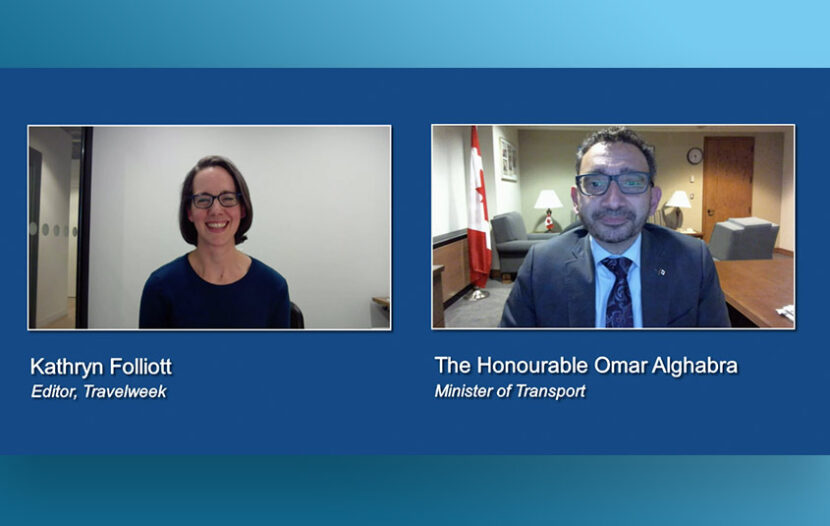TORONTO — Recovery, advocacy and sustainability were just some of the key issues discussed at Travelweek’s latest virtual conference, featuring an esteemed panel of speakers that included Canada’s Minister of Transport Omar Alghabra.
Taking place Oct. 20, ‘Future of Travel: Rebound’, Travelweek’s seventh installment in its hugely successful Future of Travel conference series, got to the crux of industry issues that continue to impact travel’s recovery at this stage of the pandemic. In addition to the Minister, speakers included Wendy Paradis, President, ACTA; Guy Young, Chief Trade Engagement Officer, TTC Tour Brands; Sandra Bailey Moffatt, Chair, ETC and Manager, Tourism Ireland; Una O’Leary, General Manager, Canada, Virtuoso; and Paula Vlamings, Chief Impact Officer, Tourism Cares.
‘Future of Travel: Rebound’ also featured updates from G Adventures, Sunwing, Avalon Waterways, CIE Tours and SATA Azores Airlines. Agents also heard the latest news from several destinations including Tourism Australia, Aruba Tourism, Italian National Tourist Board, Saint Lucia, German National Tourist Office, Visit Flanders, Tourism Ireland and Tourist Office of Spain.
To watch the conference in its entirety, click here.
“We are so grateful to all of our speakers who not only shared new insight into pressing issues, but also their optimism for a robust winter season and significant gains in recovery in 2023,” says Devin Kinasz, Publisher of Travelweek. “At this critical time for the travel industry, it’s more important than ever that borders remain open, flights continue to operate, and travel agents get the support they need to keep the momentum going. As many of our speakers noted, all signs are pointing to a welcome return to normalcy.”
What if the travel industry shuts down again?
Although Canada finally eliminated all COVID-19 border measures on Oct. 1, concerns remain that they may return in the event of future outbreaks. When asked whether the federal government can commit to providing additional financial aid should the travel industry gets shut down again, Minister Alghabra noted that during the pandemic the federal government put $11 billion towards aid packages for the travel and tourism sector.
“In the last two years, our government has demonstrated that we have not only resolved to do what’s necessary to protect the health and safety of Canadians, but also to support Canadians, small businesses and our economy,” said the Minister. “The $11 billion included support to airlines, airports and workers. We have demonstrated that we won’t leave our workers behind, we won’t leave our industry behind. And God forbid, I hope we never find ourselves in a moment in time where we have to reintroduce measures, but our commitment to doing what is right, whether it is to protect the health and safety of Canadians or to support Canadians during these difficult times, remains solid.”
The Minister was also asked which travel restrictions would possibly return, whether it be mandatory masking, the ArriveCAN app, random testing or hotel quarantines.
“I hope we never find ourselves once again in the same position where we were at the beginning or throughout the pandemic,” he said. “But we will also do what we did before, which is be guided by advice, by science, by data. There will always be reluctance to impose extraordinary measures, but if it’s necessary it will be guided by the desire to save lives.”
Advocating for upfront commissions
To prepare for that worst-case scenario of another possible shutdown, Wendy Paradis, President of ACTA, said that the organization is in constant contact with the federal government about the restrictions that were in place throughout the pandemic. ACTA also recently released a lesson-learns report following feedback from infectious disease specialists and medical professionals, which found that these restrictions only slowed down the virus by a few days or, at most, a week.

Wendy Paradis
“What this meant is that our industry was absolutely decimated, and the outcome was that these border measures, etc., overall didn’t make very much difference. So we continue to meet with the government and I think that many people are paying attention and really understand that,” said Paradis.
Aside from addressing border measures, ACTA also continues to advocate on behalf of travel agents for upfront commissions, particularly now with many still struggling to recoup losses from the pandemic. In fact, many members reported upwards of 80%-100% drops in revenue in ACTA-led polls throughout the pandemic.
“Financially, the situation is quite severe. It is getting better but you just can’t recover two years of zero revenue and make that up in a few months,” said Paradis. “So we are asking travel suppliers that they pay commission at the time of final payment, or at the very least, at the time when it’s 100% non-refundable. That is certainly an ask that we have of travel suppliers, to have a more equitable relationship with travel agencies and travel agents.”
Europe is back – in a big way
Heading into the winter season, Sandra Bailey Moffatt, Chair of the European Travel Commission and Manager of Tourism Ireland, said that travel to Europe has been on a steady climb throughout the year, particularly in recent months with the loosening of travel restrictions in Canada and around the world. In 2019, pre-pandemic, a total of 6.7 million Canadians visited Europe, accounting for nearly one-fifth of all Canadian outbound travel. In 2021, numbers were still down about 80% from pre-pandemic levels, however, in 2022, Canadian arrivals vastly improved, down just 41% from 2019.

Sandra Bailey Moffatt
Even more encouraging, Moffatt cited recent research that shows approximately 60% of Canadians want to visit Europe, and they want to do so via multiple country trips with an average of three countries per trip. By year’s end, 4.4 million Canadians are expected to arrive in Europe in 2022, with total arrivals on track to reach up to 97% of pre-pandemic levels by the year 2025.
“There’s no doubt that the removal of border measures was a welcome move for travellers. We’re confident that the latest update to border measures will have a positive impact on bookings, serving to reassure clients that things have now returned to normal,” said Bailey Moffatt. “And in Canada, we’re really seen a strong resumption of flight connections to Europe, which also signals the beginning of that rebound in international travel here.”
Sustainability and how travel agents can help
To anyone who thinks sustainability is simply too big of an issue for just one person to tackle, Paula Vlamings, Chief Impact Officer of Tourism Cares, had this piece of advice: “Just start.”
Speaking directly to travel agents, Vlamings said they play a “critical role” in the sustainable movement, which has grown leaps and bounds in recent years, not just in the travel industry, but across industries around the world. “Just starting” can simply mean making more conscious purchasing decisions, for both travel agents and travellers.

Paula Vlamings
“Just looking at a company and asking, are they doing anything? Are they saying anything about sustainability on their website?’ It’s a very competitive field out there, with thousands of companies that travellers can engage with. And if they understand that every single dollar that they spend has an impact on the world, they can make those choices,” said Vlamings.
For travel agents specifically, Vlamings recommends purchasing responsible, “circular economy” gifts to send to their clients, booking locally-owned hotels, and recommending travel in the off-season to minimize impact on local cultures and infrastructure.
“There’s a lot that they can do, and if they don’t see that from the businesses that they’re working with, they should ask those questions and find a way to engage with those companies,” she said.
What’s trending, what’s selling
When asked what new trends he’s noticing at this stage of the pandemic, Guy Young, Chief Trade Engagement Officer at TTC Tour Brands said young people continue to spearhead travel’s rebound, with Contiki – The Travel Corporation’s group adventure operator that caters to 18-35 year olds – doing “extremely well both in 2022 and going into 2023.” He also noted that the company’s Costsavers brand is also performing well, which he attributes to its flexible travel options, something travellers have valued amid the unpredictability of the pandemic.

Guy Young
In terms of when people will be travelling, Young noted that Q2 in 2023 is the quarter to watch, with more clients set to depart in April versus September.
“And that’s good news for us because September is typically our busiest month,” said Young. “September 2019 was well ahead of April, and we’re seeing quite the opposite going into 2023. So that, in a way, is really good news for us because we do want to sell the earlier departures and we do know September is going to be coming strong as we get further into the booking season.”
As for which destinations are selling, Young added that 70% of the company’s sales are coming from its top eight destinations, including Italy, the UK, Ireland and Spain. But also picking up steam are destinations like Portugal, Iceland, Egypt and, very recently, Japan.

Una O’Leary
Speaking on the luxury market, Una O’Leary, General Manager, Canada at Virtuoso, also shared several key insights into booking trends. More than three-quarters (76%) of Virtuoso advisors have seen an increase in ultra-luxe travel, with African safaris, Caribbean getaways, international city destinations and ocean cruises being the company’s top preferred experiences.
“Upscale travellers are ready to resume their pre-pandemic lives, and they consistently lead the way even during the shaky times,” said O’Leary. “In January 2022, we saw 85% say that they were ready to travel, and 86% planning to take an international trip. And during the summer, as everybody’s well aware here in Canada, airports were overwhelmed with air traffic and lost baggage. But that did not seem to deter Virtuoso travellers from getting out there.”
As for how people are travelling, O’Leary said the most popular way to travel right now is with a spouse or a significant other, followed by travelling with friends and family with kids under 18. And also notable, the highest level of interest is coming from the 65-plus age group, showing an increase from 4% in 2019 to 18% in 2022.
To watch ‘Future of Travel: Rebound,’ click here. Also, be on the lookout for Travelweek’s special Future of Travel edition on Nov. 3.

